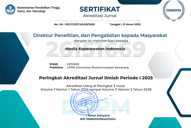Factors associated with dietary and fluid restriction adherence of chronic kidney disease patients undergoing hemodialysis
(1) Fakultas Keperawatan Universitas Padjadjaran
(2) Fakultas Keperawatan Universitas Padjadjaran
(3) Fakultas Keperawatan Universitas Padjadjaran
(*) Corresponding Author
Abstract
Keywords
Full Text:
PDFReferences
Ok E, Kutlu FY. Hopelessness, Anxiety, Depression and Treatment Adherence in Chronic Hemodialysis Patients. Int J Caring Sci 2019;12:423–9.
Perdana M, Yen M. Factors Associated With Adherence to Fluid Restriction in Patients Undergoing Hemodialysis in Indonesia. Journal of Nursing Research 2021;29:e182. https://doi.org/10.1097/jnr.0000000000000457.
Lyu CM, Zhang L. Concept analysis of adherence. Frontiers of Nursing 2019;6:81–6. https://doi.org/10.2478/FON-2019-0013.
Alosaimi FD, Asiri M, Alsuwayt S, Alotaibi T, Mugren M Bin, Almufarrih A, et al. Psychosocial predictors of nonadherence to medical management among patients on maintenance dialysis. Int J Nephrol Renovasc Dis 2016;9:263–72. https://doi.org/10.2147/IJNRD.S121548.
Mukakarangwa MC, Chironda G, Bhengu B, Katende G. Adherence to Hemodialysis and Associated Factors among End Stage Renal Disease Patients at Selected Nephrology Units in Rwanda: A Descriptive Cross-Sectional Study. Nurs Res Pract 2018;2018:1–8. https://doi.org/10.1155/2018/4372716.
Smyth B, Jones C, Saunders J. Prescribing for patients on dialysis. Aust Prescr 2016;39:21–4. https://doi.org/10.18773/austprescr.2016.008.
Halle MP, Nelson M, Kaze FF, Jean Pierre NM, Denis T, Fouda H, et al. Non-adherence to hemodialysis regimens among patients on maintenance hemodialysis in sub-Saharan Africa: an example from Cameroon. Ren Fail 2020;42:1022–8. https://doi.org/10.1080/0886022X.2020.1826965.
Ozen N, Cinar FI, Askin D, Dilek MUT, Turker T. Nonadherence in hemodialysis patients and related factors: A multicenter study. Journal of Nursing Research 2019;27:1–11. https://doi.org/10.1097/jnr.0000000000000309.
Ibrahim MM, Mokhtar IM. Effect of Nursing Training on Identification, Prevention and Management of Pressure Ulcer among Stroke Patients and Its Outcomes. Egyptian Journal of Health Care 2020;11:391–416. https://doi.org/10.21608/ejhc.2020.119022.
Wu SFV, Hsieh NC, Lin LJ, Tsai JM. Prediction of self-care behaviour on the basis of knowledge about chronic kidney disease using self-efficacy as a mediator. J Clin Nurs 2016;25:2609–18. https://doi.org/10.1111/jocn.13305.
Agustina F, Yetti K, Sukmarini L. Contributing factors to hemodialysis adherence in Aceh, Indonesia. Enferm Clin 2019;29:238–42. https://doi.org/10.1016/j.enfcli.2019.04.028.
Ozkan I, Taylan S. Diet and fluid restriction experiences of patients on hemodialysis : a meta-synthesis study Experiencias de pacientes en hemodiálisis con restricción de dieta 2022;42:22–40.
Oh HS, Park JS, Seo WS. Psychosocial influencers and mediators of treatment adherence in haemodialysis patients. J Adv Nurs 2013;69:2041–53. https://doi.org/10.1111/jan.12071.
Ahrari S, Moshki M, Bahrami M. The Relationship Between Social Support and Adherence of Dietary and Fluids Restrictions among Hemodialysis Patients in Iran. J Caring Sci 2014;3:11–9. https://doi.org/10.5681/jcs.2014.002.
Reyes M, Fuertes JN, Moore MT, Punnakudiyil GJ, Calvo L, Rubinstein S. Psychological and relational factors in ESRD hemodialysis treatment in an underserved community. Patient Educ Couns 2021;104:149–54. https://doi.org/10.1016/j.pec.2020.06.002.
Pratiwi SH, Sari EA, Kurniawan T. Kepatuhan Menjalankan Manajemen Diri Pada Pasien Hemodialisis. Jurnal Perawat Indonesia 2019;3:131. https://doi.org/10.32584/jpi.v3i2.308.
Mailani F, Bakri SO. The Duration of Hemodialysis Treatment and the Adherence of Chronic Kidney Disease Patients in Fluid Intake Limitation: a Relationship. Caring: Indonesian Journal of Nursing Science 2020;2:43–8. https://doi.org/10.32734/ijns.v2i1.4188.
Clark-Cutaia MN, Ren D, Hoffman LA, Burke LE, Sevick MA. Adherence to Hemodialysis Dietary Sodium Recommendations: Influence of Patient Characteristics, Self-Efficacy, and Perceived Barriers. Journal of Renal Nutrition 2014;24:92–9. https://doi.org/10.1053/j.jrn.2013.11.007.
Beerendrakumar N, Ramamoorthy L, Haridasan S. Dietary and Fluid Regime Adherence in Chronic Kidney Disease Patients. J Caring Sci 2018;7:17–20. https://doi.org/10.15171/jcs.2018.003.
Siagian YDNAlitS. Analisis Faktor Yang Berhubungan Dengan Kepatuhan Pembatasan Asupan Cairan Pasien Hemodialisa 2021;4:71–80.
Hakiki AF. Analisis Faktor-Faktor yang Mempengaruhi Kepatuhan Asupan Cairan dan Nutrisi pada Klien Hemodialisis di RS PKU Muhammadiyah Yogyakarta. Doctoral Dissertation 2015.
Masuli, Sherly. FAKTOR-FAKTOR YANG BERHUBUNGAN DENGAN KEPATUHAN PASIEN E-mail : [email protected] Abstrak PENDAHULUAN Gagal ginjal kronik merupakan gangguan fungsi renal yang progresif dan ireversibel , kemampuan tubuh gagal untuk mempertahankan metabolisme dan ke. Jurnal Keperawatan Profesional (JKP) 2019;4:1–9.
Al Husna CH, Yetti K, Sukmarini L. Determinant of fluid adherence among hemodialysis patients in Malang, Indonesia. Enferm Clin 2019;29:117–22. https://doi.org/10.1016/j.enfcli.2019.04.018.
Susilawati E, Latief K, Khomarudin K. Efikasi Diri Dan Dukungan Sosial Pasien Hemodialisa Dalam Meningkatkan Kepatuhan Pembatasan Cairan. Faletehan Health Journal 2018;5:39–48. https://doi.org/10.33746/fhj.v5i1.7.
Gartika N, Setiawati E, Hidayat Y. The Relationship of Self-Efficacy with Adherence in Restricting Fluid Intake in Middle Adult Hemodialysis Patients. J Phys Conf Ser 2021;1764:8–13. https://doi.org/10.1088/1742-6596/1764/1/012006.
Li H, Jiang Y fang, Lin CC. Factors associated with self-management by people undergoing hemodialysis: A descriptive study. Int J Nurs Stud 2014;51:208–16. https://doi.org/10.1016/j.ijnurstu.2013.05.012.
Article Metrics
Abstract view : 1375 timesPDF - 25 times
DOI: https://doi.org/10.26714/mki.6.3.2023.198-208
Refbacks
- There are currently no refbacks.
Copyright (c) 2023 Dewin Safitri, Tuti Pahria, Urip Rahayu

This work is licensed under a Creative Commons Attribution 4.0 International License.
This journal is indexed by:
Kedungmundu Raya No. 18 Semarang NRC Building Universitas Muhammadiyah Semarang
Phone: 02476740287
Fax: 02476740287
Email: [email protected]





















